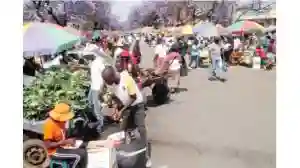Bulawayo City Council council have blocked a move to reverse a council resolution barring informal traders from operating along Fifth Avenue.
The councillors say the road should be opened for human and vehicular traffic.
The local authority closed the road to vendors at the onset of the COVID-19 pandemic in 2020.
However, two years later, the council has failed to remove the informal traders operating along Fifth Avenue.
The local authority identified sites for vendors to operate from. The spots are near the Highlanders Football Club clubhouse and another at the corner of Lobengula Street and First Avenue. But the vendors say the sites are far away from their targeted clients.
According to the latest council report that was tabled before a full council meeting last Wednesday, council management had proposed the official reopening of the street to accommodate informal traders. Reads the report:
With the coming of COVID-19, council on 3 June 2020 resolved that 5th Avenue (stretching from Robert Mugabe to Lobengula Street) be closed off permanently to any form of trading and henceforth the closed street be re-opened as a public road that accommodates two-way traffic as per the Roads Act provisions.
Despite the fact that this whole process was consultative, disgruntled informal traders took the matter to court.
The court dismissed their application and upheld the Council’s resolution of opening the road for vehicular traffic.
There had been an application from informal traders to close off 5th Avenue for informal trading activities, in light of the discussions around 5th Avenue, four options exist.
The options are informed by the need to strike a balance amongst a multifarious use, that is parking, informal trading and vehicular traffic and the property owners.
The first option tabled would be to maintain the existing bays prior to COVID-19 and leave the planning area with 880 informal trading bays.
The second is to have the planning area with 952 informal trading bays occupying parking bays on both ends of the planning area.
The third option suggested is that the area will have two riding lanes and parking bays to the north but with 557 informal trading bays.
The fourth and final option is to maintain the status quo of opening up 5th Avenue to vehicular traffic without any consideration of informal trading activities.
Management was reportedly pushing for the adoption of option three, saying it leaves the area with fewer vending bays and would accommodate all the users including property owners.
However, councillors dismissed the move by management. Acting Mayor, Councillor Mlandu Ncube said what was dangerous with the move was that it would appear as if the local authority was regularising illegality. He said:
We cannot create a problem by trying to solve another problem, in this city we are clear that 5th Avenue is a road, people must drive along that street.
When that street was closed there were people operating there, whom we consulted properly and gave them bays somewhere else, some, unfortunately, did not get them because of the limited space and went home.
Suddenly, despite this resolution, we woke up to people now operating there and two years after we are failing to remove these illegal elements, now we want to regularise those illegal elements, which is dangerous.
We will create a problem, with our people who were originally trading there, we can only start talking about that area when all offenders have left.

